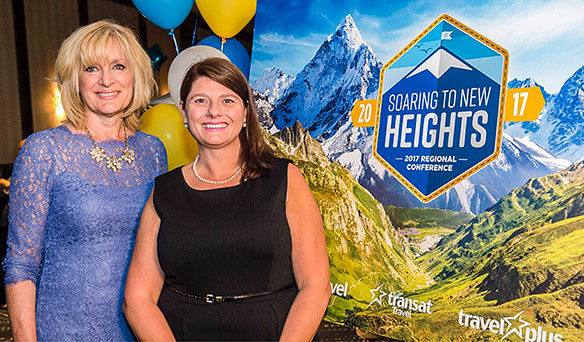
Ready for the bricks & mortar evolution
Bob Mowat
For the past 15 years, people have been telling Nathalie Boyer that traditional bricks & mortar travel agencies are simply not relevant and will soon disappear.
Well, it hasn’t happened and although Boyer, general manager of Transat Distribution Canada (TDC), is certainly keenly aware of the challenges the retail travel business faces these days – like the aging demographics of travel professionals and reduced agency margins – she’s also adamant that “we are in a very resilient industry.”
In fact, Boyer said that: “At TDC, we are looking to grow our business. We are seeing a lot of opportunities in the market and in the field for us to explore. And when I [talk about] growing or expanding, it’s not necessarily in terms of numbers of locations, but it’s how to [help] our travel professionals to innovate more, to be more creative, to make sure that they are relevant to the client at the end.”
And as Boyer sees it, “not being capable of adapting ourselves and evolving with the demands of the clients” is the biggest challenge for bricks & mortar agencies, observing “if we are not putting the client at the centre of everything we do, we are going to disappear.”
That focus on the customer is critical, she said, because “clients are evolving. They are more knowledgeable. They are more demanding. And as travel professionals, we need to adapt to that if we want to survive.”
She told Canadian Travel Press that today, the average age of the travel professionals in TDC’s network is around 50 years old, while the average age of the customer coming into those offices and buying a leisure package is about 52 years old.
Ready for the evolution
For Boyer that means that “the next 10 years are kind of guaranteed” for TDC, “because a Baby Boomer will tend to buy more, but after 10 years, where are we going to be? So, it is time for us to take a step back and see where we want to be. How we want to evolve. And how we need to adapt to the client.”
The reality, she explained to CTP, is that “the younger generation is not really coming into the travel agency business these days. So we need to find ways to attract them. That’s why we are investing in web sites. That’s why we are evolving in other ways to be closer and more relevant to that client, and this is how we are seeing TDC evolving in the near future.”
And there’s no doubt that Transat is committed to bricks & mortar, considering it currently has 447 locations today, owning 60 of those locations itself.
“If we did not believe in bricks and mortar, I would say that Transat would have closed those offices a long time ago. We do believe that there’s a [definite] place for travel agencies to grow. Will we see consolidation in the market in bricks and mortar – for sure,” Boyer said.
But she also points out that today’s customer “is overwhelmed with all of the information that they are finding on the Web, and they want to rely on someone who is more expert and this is where the travel professional will become relevant.”
The upshot of all of this for Boyer is that: “For sure, we need to stay in bricks and mortar,” before continuing that TDC’s parent company (Transat A.T.) “has been built by being a travel agency, and Mr. [Jean-Marc] Eustache, and all the senior management team, has said that one of the pillars of Transat was its distribution and the bricks and mortar [agency] specifically.”
The future of bricks and mortar was certainly on the agenda at a recent strategy and planning session that included a detailed discussion on innovation.
“We have plenty of ideas of how to be relevant and how to make sure that bricks and mortar will survive in the market. So stay tuned to see our initiatives coming soon, [because] I can assure you that we are [going to be] very proactive [in that area],” Boyer told CTP.
Staying relevant
TDC has certainly been proactive in providing the travel professionals in its network with the kind of tools and training they need in order to continue to be “relevant to their customers.”
“Education is paramount,” said TDC’s vice-president, marketing and industry relations, Susan Bowman, explaining that travel professionals “need to be knowledgeable” because “consumers are broadening out from not [only the] traditional destinations that Canadians have gone to. They’re going further afield, and we’re attracting different market segments.”
She continued: “Someone who has travelled to the Caribbean ten times may now be ready to take a trip to South America or beyond. So, we need to make sure that our travel professionals are educated, knowledgeable and able to service wherever these market segments wish to go.”
One of those segments, Millennials, is clearly topping everybody’s list these days, with Bowman observing: “They go for different types of travel. They like experiential travel, hands-on travel. They want to be doing things. They want to be contributing to the environments that they’re entering into. So, even offering them different services and products is different than what a Baby Boomer might be looking for.”
To that end, Bowman said that TDC has developed an extensive array of training programs for its members, and for the first time this year, it did a special training academy that focused on both product and sales.
TDC travel professionals “were provided with a sales skill in the morning, product education through the day and into the early evening, they had to put the two together and actually be able to use the sales skill knowledge along with being able to qualify a customer and put the right product in front of them,” Bowman told CTP.
Those sessions, she said “were in the 95 percentile for satisfaction, both from the suppliers who came – all of our preferred partners – as well as the delegates [and] I think this speaks to what people need and want. So, it isn’t just that TDC believes in this, it’s what the travel professionals are looking for.”
What’s the model?
For Boyer, one of the big challenges facing the industry, and TDC, is the age of its travel consultants. “Everyone is talking about finding the right resources and trying to attract new travel professionals,” she said.
Bowman agreed noting that this is a challenge “around making sure we have the right talent group and the right demographics of talent group – if you want to attract Millennials, it’s better to have Millennials in your workforce.”
“I think for us,” Bowman continued: “it’s about how does a retail model fit when you’re servicing the mass market. It’s almost like if you had the perfect travel agency, you would have three consultants that are age 50 and you would have three that are Millennials and you would have three in between to do GenX and GenY. It’s about getting the best kind of fit with the consumer that’s coming into your agency.”
In this respect, one of the positive signs that Boyer has been seeing in Quebec is the growing number of younger travel agency owners arriving on the scene. And that’s definitely a trend that bodes well for the future.
She told CTP: “They are bringing new ideas; new ways of seeing things; and you can really talk business with them and that makes a big difference at the end of the day,” she told CTP.
All about the team
So, what makes TDC different from other retail groups?
Well, as far as Boyer is concerned, it’s the fact that: “I have the most amazing, most efficient and most productive team on earth. That’s what makes us different from the competition – they don’t have my team.”
And she continued: “We are different. We are passionate people. We love what we’re doing. We’re working great together. Our goal – and obsession – is making sure all our members and our travel professionals have all the tools that they need, and we are rethinking ourselves many, many times a year, so I think that’s a difference.”
Plus TDC’s strong retail brands – like Transat Travel, Marlin Travel, Club Voyages, TravelPlus, etc. – also benefit from “the aura” of the Transat brand itself.
What a deal!
When TDC announced the renewal of its contract with Air Miles for another five years, one of the ‘sit-up-and-take-notice’ bits of information in that announcement was that in doing so, it has now taken over all of the Air Miles program’s package vacation and cruise redemptions on an exclusive basis.
TDC’s Susan Bowman explained that TDC has been an exclusive sponsor in the retail category with Air Miles for almost 20 years and that allowed it to issue and redeem Miles in the ‘collectors’ program.
With the new agreement in place, Air Miles has now advised its 10 million collectors in Canada that if they want to redeem their Dream Miles for a package vacation or a cruise, they are to visit one of TDC’s agencies.”
The result, said a clearly pleased Bowman, is that “tens of thousands of people will be coming into [our agencies], and it’s because in that 20 years, the collectors that have come to TDC have been well served and extremely happy with the service that they have received.”
She also told CTP that when those collectors do come into redeem their Miles, TDC consultants tend to use those redemptions to get them a better travel experience.
“It’s an opportunity to say to somebody, let’s work with your Air Miles program and see if we can’t make that an amazing travel experience for you,” Bowman said, noting that it’s the added value that “brings people back to us over and over again. It’s exclusive with us, so it really is the winning formula for loyalty.”



